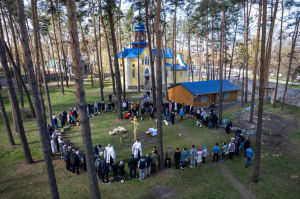Revelation 21: Millennial Kingdom — new Heaven, a new Earth and a New Jerusalem

Urban revitalization projects are not something new, but they certainly deserve credit for making all things new in various cities worldwide. Perhaps one of the most notable examples is the revitalization of the South Bronx in New York City during the late 20th century.
The 1970s marked a tumultuous time for New York City, particularly the Bronx, which faced considerable economic decline, rampant crime, and social upheaval. A series of factors, including white flight and economic downturns, contributed to the area’s decline leading to widespread urban blight and devastating fires that destroyed much of the infrastructure.
The city was also grappling with the terror of Son of Sam, the serial killer, whose reign of terror further exacerbated the atmosphere of fear and uncertainty. The social disintegration created fertile ground for corruption, delinquency, and lawlessness, which seemed to culminate in the citywide blackout of 1977 that plunged New York City into a night of chaos — a night of arson and fires, looting, rioting, and robberies.
During this period, the South Bronx was plagued by poverty, crime, and urban decay. Pictures of that day and place are truly images of malaise and misery, with numerous buildings burned out or abandoned.
However, community organizations, along with city government efforts and private investments, initiated a series of redevelopment projects aimed at renewing, reinvigorating, rebuilding infrastructure, improving housing, and attracting business back to the area.
Over time, the South Bronx experienced a transformation, with renovated buildings, new housing developments, and improved public spaces. Community gardens and parks replaced vacant lots, and once-neglected streets became safer and, therefore more inviting. Today, the features that defined the area in the 1970s are drastically different from the thriving metropolis of the early 21st century.
Admittedly, challenges remain, but the revitalization efforts, unquestionably, helped to refresh and renew the South Bronx and significantly improved the quality of life for its residents.
Where despair and decay were prevalent, there is now hope and restoration. This urban landscape has seemingly risen from the rubble and the ashes, much like the renewed earth described in Revelation chapter 21 — echoing somewhat the promise proclaimed in verses 5 through 8, which read:
“And the one sitting on the throne said, ‘Look, I am making everything new!’ And then he said to me, ‘Write this down, for what I tell you is trustworthy and true.’ 6 And he also said, ‘It is finished! I am the Alpha and the Omega — the Beginning and the End. To all who are thirsty, I will give freely from the springs of the water of life. All who are victorious will inherit all these blessings, and I will be their God, and they will be my children. But cowards, unbelievers, the corrupt, murderers, the immoral, those who practice witchcraft, idol worshipers, and all liars — their fate is in the fiery lake of burning sulfur. This is the second death.”
In today’s world, we could figuratively draw parallels to the conditions of the South Bronx in the 1970s, highlighting a desperate need for renewal and restoration on a broader scale.
Just as the South Bronx, underwent economic decline and social unrest, today’s global landscape grapples with a myriad of serious and debilitating issues. These include disruptions in the global supply chain, escalating inflation rates, widespread unemployment and underemployment, mounting debt burdens, global protest movements, and geopolitical tensions that loom ominously, with the potential to escalate into conflicts akin to World War III.
Moreover, the world’s most pressing issues stem from moral and spiritual concerns. These include diminishing trust in the Bible and its core Christian doctrines and values, a noticeable growth in atheism and the “nones,” rising levels of crime and violence, a noticeable erosion of family values, a concerning lack of civility and respect for others, the normalization of vice and immorality, a troubling absence of empathy and compassion for the most vulnerable, and a pervasive disregard for individuals’ God-given rights.
While it’s true humanity has long grappled with similar challenges, the current state of affairs presents a unique and pressing situation. A discerning observer of contemporary events can readily determine that today’s struggles are not only more numerous but also represent an onslaught of crisis unfolding concurrently while escalating in intensity. Consequently, the ramifications are more far-reaching than ever before.
In Matthew chapter 24 and verses 3 through 8, Jesus drew an analogy between the signs heralding the end times and the initial stages of labor experienced by a pregnant woman. By likening these signs to the early contractions of childbirth, he conveyed that they would signify the onset of a period marked by escalating turmoil, ultimately culminating in the establishment of God’s Kingdom.
Our world faces an unprecedented convergence of challenges — as complex, intertwined, and largely insurmountable. It has become progressively evident that no purely human endeavor can unravel the knot.
However, the Bible offers a promise of hope. A day will come when Christ returns and concludes his earthly Millennial Kingdom and the Lord Himself will initiate an unparalleled program of renewal and revitalization. This moment will mark the beginning of eternity, bringing forth a new Heaven, a new Earth, and a New Jerusalem. In this divine transformation, trouble, suffering, sorrow, and death will cease to exist — forever.
“Look, I am making everything new” (v.5), said the One sitting on the throne.
There is some debate by Christian scholars as to who is speaking here. Is it God, the Father? Or is it the Lord Jesus? Some argue the speaker is God, the Father, who is often depicted as seated on the throne in the book of Revelation. Others suggest that it must be Jesus, considering his close association with the theme of making all things new throughout the New Testament, as well as the fact that he is often depicted as speaking in Revelation. Both interpretations can be supported within the broader context of the book and its themes of renewal and regeneration.
1. Nevertheless, it seems more likely to be the voice of the Savior, who is speaking, because the words the apostle John is urged to write down in verse 6 seem unique to Christ:
2. “It is finished.” Do these words sound familiar? Jesus first said these words on the Cross of Calvary, where he expressed that he had completed his mission of securing humanity’s salvation by his sacrificial death. He essentially used this same phrasing again in Revelation chapter 16 and verse 17, signifying the completion of God’s irrevocable judgment and the fulfillment of his divine purpose in bringing about the end of human history as we know it. Finally, this same expression is in Revelation chapter 21 and verse 6, where the Lord is speaking of the culmination of God’s plan in bringing about a complete rebirth of the cosmos.
“I am the Alpha and the Omega — the Beginning and the End.” These words are attributed to Jesus in Revelation chapter 1 and verse 11. Alpha and Omega are the first and last letters of the Greek alphabet and in this context, they communicate Jesus’ eternal existence, His divine nature, and His supreme authority over all creation, transcending all limitations of time and space. The same expression is repeated by the Lord Jesus in Revelation chapter 22 and verses 12 through 13 when Jesus promises to return and once again reaffirms his divine identity and eternal nature.
3. “To all who are thirsty, I will give freely from the springs of the water of life.” Remember in his conversation with the Samaritan woman at the well, Jesus offered living water, saying: “If you only knew the gift God has for you and who you are speaking to, you would ask me, and I would give you living water … those who drink the water I give will never be thirsty again. It becomes a fresh, bubbling spring within them, giving them eternal life” (John 4:10-14). On the last day of the festival of Tabernacles, Jesus stood and said in a loud voice, “Anyone who is thirsty may come to me! Anyone who believes in me may come and drink! For the Scriptures declare, ‘Rivers of living water will flow from his heart’” (John 7:37-38). Then, in Revelation chapter 21 and verse 6, Jesus extends the invitation again to receive spiritual refreshment, renewal, and eternal life.
In these passages, which are so unique to Jesus, we are confronted with his claims to be Almighty God, the One who is eternally existent, and therefore he implores that we let him freely save, renew, transform, and fit us for that eternal dwelling place where we may enjoy him ceaselessly.
The incomparable Baptist preacher, the late W. A. Criswell, in one of his sermons on Revelation expounded on this unequaled invitation, saying:
Do not bring a price. Do not seek to buy at a cost. Do not bring good works and commendations. Do not bring recommendations. Just come as you are … And whosoever will, let him take of the water of life freely. It is God’s good pleasure to give us our salvation. It is a gift of God. It is the Lord’s love and desire to bestow it upon us without price … Let the lost sinner take the gift of salvation freely. Let him drink at the fountain of the river of life and live forever. Drink full and deep.
I heard one time of a little emaciated boy from a large family, being taken to a hospital, to be ministered to because he was starving. The sweet nurse came to the starved lad with a big glass of milk in her hand. She gave it to the little fellow and said, ‘Drink.’ With eager hands, the lad took the glass of milk and asked, ‘Nurse, how deep can I drink?’ What a picture of poverty, want, and need in that question! For, you see, every glass of milk that little fellow had ever seen had to be divided with the children of a large family. Each one could drink just so much, just so far down the glass. There was not enough to spare. So, the little fellow, holding the glass in his hand, said, ‘Nurse, how deep can I drink?’! The nurse replied: ‘Dear child, drink to the bottom. Drink to the full.’
We shall never exhaust the goodness, the grace, and the mercy of our Lord God. Come, and drink to the full. These things are ever and forever ours … He [Christ] is the water of life to drink … Come, give your heart in trust to Him.
Jesus solemnly promises that everyone who would be victorious in the end, inherit the blessings of all things eternal, and be reborn as a child of God, must believe in Him. “For every child of God defeats this evil world, and we achieve this victory through our faith” (I John 5:4).
By contrast, the unbelieving, whose lives are characterized by eight habitual behaviors, will forever be separated from God in fiery torment.
1.Cowards — Those who lack courage and faith, particularly in the face of persecution or trials (Matthew 10:28, Hebrews 10:38-39). They will not receive Christ or live a life of obedience to him because they are afraid of the way they might be rejected by family or friends. They are frightened of the cost that comes with following Jesus.
2. Unbelievers — Those who refuse to trust in God’s promises — those who will not adhere to Christ’s benevolent Lordship (John 3:18). Those who reject the fundamental doctrines of the Christian faith — those who see Jesus as a mere historical figure, a political revolutionary, a wonderful moral teacher but just another martyr of history, a symbol of tolerance and inclusivity that completely rejects his claim to be the only way of salvation.
3. The corrupt — Those who engage in wicked or morally corrupt manners, demonstrating a disregard for God’s standards of righteousness and holiness (I Corinthians 6:9-10). — crooked politicians who take money for political favors, who abuse their powers, who use their position primarily for selfish pursuits, who take kickbacks and engage in fraudulent activities, who endorse, facilitate, and further law what God forbids — clergy who misuse church funds or donations for personal gain, extravagant lifestyles, and luxury purchases, who engage in sexual abuse, harassment, or exploitation of congregants, some of which are children or the emotionally vulnerable seeking spiritual guidance from them — those who distort or misinterpret the teachings of God’s Word for personal gain or to justify unethical behavior, such as promoting a prosperity Gospel to solicit donations.
4.Murderers — Those who promote or engage in unjust harm and aggression to purposely destroy human life (Revelation 22:15), the mafia hitman, the notorious serial killer, the mass shooter, the assassin, the robber or home invader who kills — those who advocate for and participate in the abortion industry — those who endorse or participate in the systematic extermination of an entire innocent group of people based on their ethnicity, religion, nationality, or other characteristics — those who endorse or facilitate policies that prioritize profit or personal interests over the health and safety of individuals and results in the loss of human life — those who engage in political rhetoric or the use social media platforms to assassinate someone’s reputation, (which is a form of murder) – those who carry unrepented hatred in their hearts for others the Bible says are guilty of a form of murder (I John 3:15).
5.The Immoral — Those who practice or engage in a lifestyle of sexual activity outside the bonds of marriage between one man and one woman — whether adultery, fornication, or same-sex relations (Galatians 5:19-21) — those who without conviction or struggle willfully and with abandon consume and/or produce sexually explicit materials that objectify and exploit individuals for personal gratification (Matthew 5:28, Ephesians 5:3-5) — prostitutes and sex traffickers who sell sexual favors for financial gain or material benefits (1 Corinthians 6:15-16).
6. Those who practice witchcraft — Those who engage in various occult practices, seeking supernatural powers apart from God (Galatians 5:20-21) — those who engage in rituals, spells, or incantations to influence events or outcomes through supernatural means — those who seek to know the future or the unknown through divination — those who try to communicate with the spirits of the dead through mediums and seances. The practice of recreational drug use is an extension of sorcery.
7. Idolators — Those who worship false gods rather than the one true God as revealed in the Holy Bible (I Corinthians 6:9-10) — those who are habitually given to something or someone more than they are given to God, whether material possessions, career or success, personal ambitions, physical pleasures, addictions such as drug abuse, gambling, or alcohol — those engaged in religious activities, rituals, or ceremonies without genuine faith, love, or obedience to God — those given to political ideologies, social movements, or philosophical beliefs as their ultimate source of meaning, purpose, and truth rather a right relationship with God — those who elevate national identity, pride, or allegiance above one’s commitment to the Kingdom of God.
8.Liars — Those who regularly, repeatedly, and purposely are engaged in deceitful behaviors, falsehoods, or dishonesty (Revelation 22:15) — those, who as a way of life, deceive for personal gain, manipulate situations to their advantage, or conceal their true intentions through deception.
In Revelation chapter 21 and verses 5 through 8, there is found a message of profound hope, assurance, and renewal amidst a backdrop of social and moral decay. However, intertwined with this message is a fearful and solemn warning of judgment. The passage paints a vivid contrast between the destinies of those who embrace faith and obedience to Christ and those who persist in unbelief and disobedience.
Rev. Mark H. Creech is Executive Director of the Christian Action League of North Carolina, Inc. He was a pastor for twenty years before taking this position, having served five different Southern Baptist churches in North Carolina and one Independent Baptist in upstate New York.



























